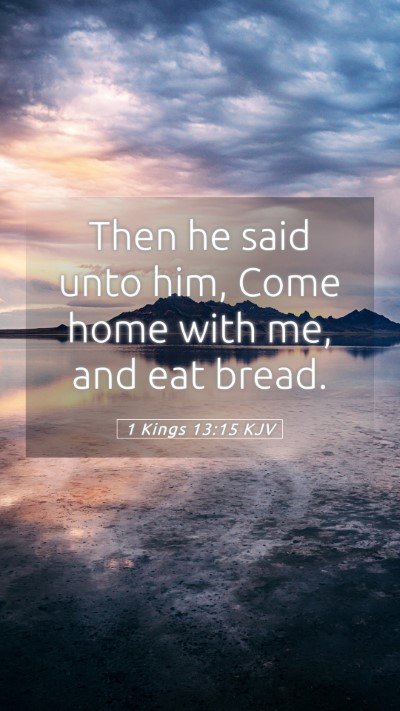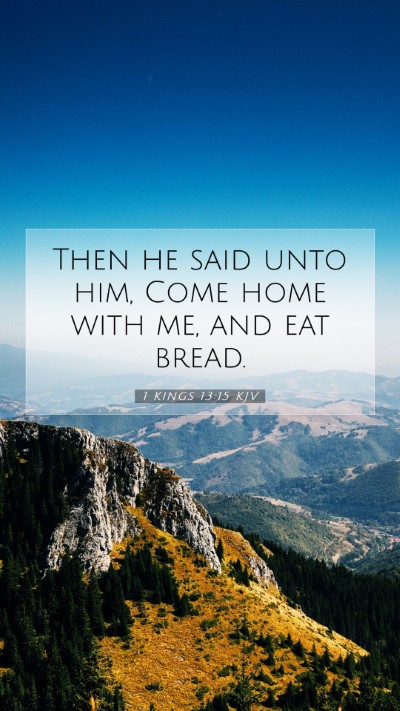Understanding 1 Kings 13:15
Bible Verse: 1 Kings 13:15
"Then he said unto him, Come home with me, and eat bread."
Overview of 1 Kings 13:15
This verse occurs in the context of a significant prophetic interaction. The verse illustrates an invitation made by an older prophet to the younger prophet who had just delivered a message from God to King Jeroboam. This passage raises numerous questions regarding obedience, temptation, and the ramifications of disobedience when one deviates from divine commandments.
Bible Verse Meanings and Interpretations
Insights from Public Domain Commentaries
- Matthew Henry: Henry emphasizes the importance of the young prophet's mission, which was to deliver a prophetic word against the altar in Bethel. The invitation to come home for a meal represents a test of the young prophet's commitment to God's command. Henry warns that even well-meaning invitations can lead us astray if they conflict with God's directives.
- Albert Barnes: Barnes provides a historical context to the actions of the older prophet. He suggests that the invitation was a trap, designed to lead the younger prophet into disobedience. This commentary urges readers to be vigilant against those who might seem to represent God, yet lead us into error. The choice made by the younger prophet serves as a pivotal moment in the narrative.
- Adam Clarke: Clarke delves into the dynamics of prophecy and authority within Israel during this time. He notes that the invitation signifies the complexity of following divine orders under human influence. Clarke encourages believers to consider carefully who they listen to and the potential consequences of diverging from God's specific instructions.
Scripture Analysis
1 Kings 13:15 is rich in lessons regarding obedience and the risks of deviating from God's will. The invitation serves not just as a physical call to dine, but also as a metaphorical challenge to the prophet’s fidelity to God’s command. This intersection of human relationship and divine obedience creates critical learning moments for believers.
Historical Context of 1 Kings 13:15
During the reign of King Jeroboam, Israel found itself divided, both politically and spiritually. The worship practices introduced by Jeroboam strayed from the commandments given to Israel, leading to an overall environment of apostasy. The young prophet's mission was a direct confrontation against this trend, highlighting the necessity of true worship in alignment with divine directives.
Significance and Application
The essence of this scripture sheds light on the importance of discerning God's will above all else. In contemporary contexts, believers are often faced with decisions that may appear benign but could lead to spiritual compromise. Applying the vigilance shown by the young prophet in adverse circumstances can guide individuals in their personal faith journeys.
Lessons from 1 Kings 13:15
- Obedience to God's Command: The necessity of adhering strictly to what God has commanded, resisting distractions or false prophecies.
- Discernment: Learning to distinguish between genuine invitations and those that may lead one away from God's purpose.
- The Consequence of Compromise: Recognizing that stepping outside of God’s path can lead to unforeseen and severe consequences.
Cross References
- 1 Kings 13:9: A previous verse where the young prophet receives God’s command.
- Galatians 1:8-9: Paul warns against deviation from the gospel, paralleling the prophetic warning given by the young prophet.
- Matthew 7:15: A caution against false prophets that can fit the scenario of the older prophet's deceptive invitation.
Conclusion
1 Kings 13:15 is far more than a simple narrative; it encapsulates the struggles of faith, the complexities of obedience, and the enduring tension between God’s commands and human influences. It serves as a reflective moment, urging believers to deeply understand Scripture and apply these insights as they navigate their spiritual paths.


